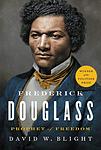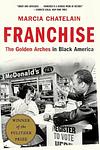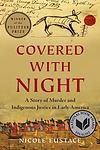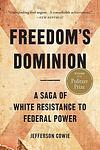Pulitzer Prize for History
This is one of the 288 lists we use to generate our main The Greatest Books list.
-
Frederick Douglass: Prophet of Freedom by David W. Blight
This comprehensive biography delves into the life of Frederick Douglass, a former slave who became a leading abolitionist, writer, and orator in the 19th century. The book explores Douglass's tireless efforts to fight for the rights of African Americans, his complex relationships with both his family and the women who supported his career, and his significant influence on American literature and politics. The narrative also examines the struggles Douglass faced in his quest for freedom and equality, offering a detailed and nuanced portrait of a man who reshaped American history.
-
Sweet Taste of Liberty: A True Story of Slavery and Restitution in America by W. Caleb McDaniel
This book tells the true story of a freed African American woman who was kidnapped and sold into slavery, and her fight for justice and restitution after the Civil War. It provides a detailed, personal account of her journey, legal battles, and the historical context of the time, shedding light on the injustices suffered by African Americans, even after they were legally freed. The narrative also explores the broader themes of racial inequality, reparations, and the lasting impacts of slavery on American society.
-
Franchise by Marcia Chatelain
This book provides a comprehensive exploration of the intricate relationship between the fast-food industry and Black America. It delves into how fast-food franchises, particularly McDonald's, became deeply embedded in African American communities from the late 20th century onwards. The narrative examines the dual-edged sword of economic opportunity and health consequences, highlighting how these corporations were seen both as engines for economic empowerment in post-civil rights America and as contributors to health and social disparities. Through a detailed historical analysis, the book reveals the complexities of corporate power, racial politics, and the quest for community stability, offering a nuanced perspective on the role of fast food in shaping contemporary American society.
-
Covered With Night by Nicole Eustace
This book meticulously examines the harrowing incident of 1722, when an Indigenous man was murdered by two white traders, unraveling the complex interplay of colonial power dynamics, justice, and diplomacy in early America. Through a detailed exploration of this pivotal event, the narrative delves into the broader implications it had on the relationships between European settlers and Native American communities, highlighting the clash of cultures, legal systems, and values. It brings to light the intricate negotiations and political maneuvers that ensued, offering a profound insight into the struggle for justice and the efforts to maintain peace on the volatile frontiers of colonial North America.
-
Cuba by Ada Ferrer
This book is a comprehensive history of Cuba, offering a deep dive into the island's complex past, from its pre-Columbian cultures to its contemporary realities. The narrative weaves through the colonial period, the struggle for independence, the role of slavery and sugar in its economy, the impact of the United States, and the revolution that has shaped its modern identity. Through meticulous research and engaging storytelling, the author presents a nuanced exploration of Cuba's political, social, and economic transformations, highlighting the resilience and creativity of its people. This work stands out for its detailed analysis and its effort to understand Cuba on its own terms, providing readers with a rich understanding of a nation often viewed through the lens of external narratives.
-
Freedom's Dominion by Jefferson Cowie
This book delves into the complex history of a rural Alabama county to explore the broader American struggle between democracy and authoritarianism from the era of slavery through the Civil Rights Movement. It meticulously examines how the local governance, economic systems, and social norms within this microcosm reflected and influenced the nation's turbulent journey towards freedom and equality. Through a detailed narrative, the work sheds light on the enduring conflicts over land, labor, and race, revealing how these issues have shaped the country's political landscape and continue to resonate in contemporary debates about democracy and authority.
Pulitzer Prize, 106 Books
The Pulitzer Prize for History has been awarded since 1917 for a distinguished book upon the history of the United States. Many history books have also been awarded the Pulitzer Prize for General Non-Fiction and Pulitzer Prize for Biography or Autobiography.
Two people have won the Pulitzer Prize for History twice; Margaret Leech, for Reveille in Washington, 1860-1865 in 1941 and In the Days of McKinley in 1960, and Bernard Bailyn, for The Ideological Origins of the American Revolution (1968) and Voyagers to the West: A Passage in the Peopling of America on the Eve of the Revolution (1987).
Added about 10 years ago.
This list has a weight of 1%. To learn more about what this means please visit the Rankings page.
Here is a list of what is decreasing the importance of this list:
- List: only covers 1 year (yearly book awards, best of the year, etc)
- List: only covers 1 specific genre
- List: only covers 1 specific country
- Voters: are mostly from a single country/location
If you think this is incorrect please e-mail us at [email protected].





